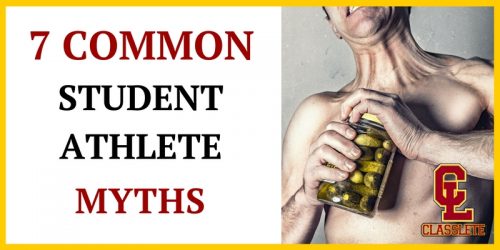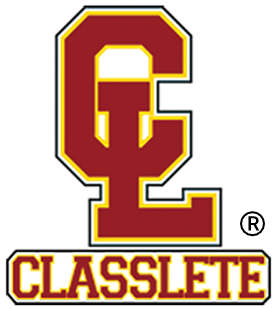 https://classlete.com/wp-content/uploads/2017/07/7-Common-Student-Athlete-Myths-500x250-1.jpg
https://classlete.com/wp-content/uploads/2017/07/7-Common-Student-Athlete-Myths-500x250-1.jpg
Student Athlete myths are too common to be even considered fiction! Like that question or comment from someone who has never played organized sports, and you just had to flat out look at them sideways for mentioning such buffoonery?
Let’s face it; many of your peers whether they are teachers, classmates, or your worst haters have by now made an observation about you that may be well justified or straight up indignant.
And if their assessment is way off base, do you sock them over the head with a baseball bat or regurgitate the same rehearsed answer you gave everyone else throughout the school year?
We reached out to the community and compiled our top 7 misconceptions about student athletes below.
-
Student Athletes Are Dumb Jocks
Usually reduced to the male species, the premise of the dumb jock likely came from the 1950’s or something because, currently in the 21st century, studies conclude that there is a strong correlation between athletic involvement and academic success as indicated by graduation rates, dropout rates, average daily attendance and average letter grades vs. non-student athletes.
The evidence speaks for itself to disprove the notion of jocks being complete idiots.
First of student athlete myths abolished!
-
We Drink Sports Beverages, Energy Drinks and Protein Shakes All Day
With all the sports drink commercials along with the hype on supplements and nutrition, its no wonder this myth made this list.
The truth is, most schools and student athletes don’t have the budgets to support these daily or weekly habits and nor should they.
Studies have shown that consuming too much of a sport drink can lead to weight gain, diarrhea, high blood pressure and a whole bunch of undesired effects.
Couple this with the impact of drinking too much caffeine from energy drinks and chugging too protein shakes, the after effects of doing so are troublesome.
Does stomach ulcers or kidney damage sound good to anyone?
No? I thought so.
-
We Could Care Less About School
Whether this is the case due to individuals not wanting to be kicked off the team due to poor academics or a strict parent who keeps their teenager in check, this couldn’t be further from the truth.
Many student athletes are wising up to the limited prospect of getting recruited to a D1 college and are genuinely honing their focus to what life after sports will look like.
In other words, we have already thought about an “Option B” after observing others and we do not want to end up like some of our unnamed uncles and cousins.
-
Someone Else Does Our School Work For Us
Have you ever handed in a homework assignment or a large school project and after your teacher graded it an A+, she looked at you odd as if this wasn’t your handiwork?
Now this is just plain disrespectful.
Yes we may have tutors, helpful parents, resourceful tools or ways to help us get the job done, but don’t judge a book by its cover.
-
Worst of Student Athlete Myths: We are Selfish Sore Losers
Yes we work hard and have less total sleep per week than most, but selfish?
Playing any sport, particularly team sports, has many intangible benefits including character building, establishing stellar principles and achieving great outcomes.
Although we can be competitive and may even want our way – no different than the average teenager at times – playing sports has an impact our integrity, generosity and compassion.
Besides, no one likes playing with a hog, right?
-
We Are Promiscuous and Party All The Time
Although there is a public perception of this being true due to the few bad apples, either from someone on your team, someone at another school or within the latest teen movie, student athletes are wising up to this stereotype.
According to this study, female student athletes reported to be less sexually active than non-female athletes in high school due to this following explanation:
“Because athletic participation increases boys’ social position within the high school status hierarchy, it may be easier for them to request or even demand sex from girls. Athletic participation also augments the social status of girls, but in contrast to boys, the status enhancement provides them with the power to resist male pressures. Social status accrued in this manner gives girls an alternative to trading sex for popularity or self esteem. Athletic participation enhances the value of the package of resources that both girls and boys bring to the sexual bargaining table.”
Contrast this with the demands and the social status of a student athlete amongst his peers, both the limited time and risk of being caught on a drinking binge is a seen a huge deterrent.
-
We Are Warriors In The Gym (reference Allen Iverson clip from stack):
Last one on the list of student athlete myths:
We all knew a star athlete in high school. The one who made it look so easy.
Have you ever looked at a peer on your team and wondered how in the world they can run faster, jump higher, push stronger or outlast the competition? With minimal practice, drills or weight lifting in the gym?
Sometimes genetics plays a major role in our performance output and with the nutrition, sports programs, and techniques being taught, often times great athletes are able to achieve great results without having to squat 5 times their body weight.
Just ask Allen Iverson, a 4 time NBA Scoring Champion and MVP, about his affinity to lifting weights and working out in the gym.
Agreed, sometimes there was just too much schoolwork and not enough hours in the day. However, don’t give others the right to pigeon hole you into one of the above stereotypical myths and give us all a bad name.
So tell us in the comment section below or join our hashtag #ImAClasslete, what other student athlete myths have you encountered?
Join our newsletter for more inspiring content like this by filling in your name and email address below.





